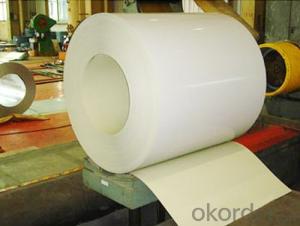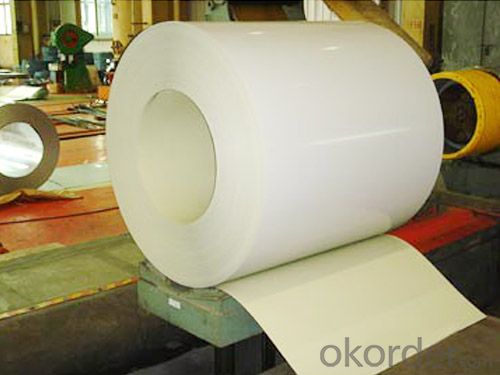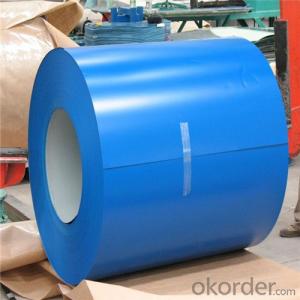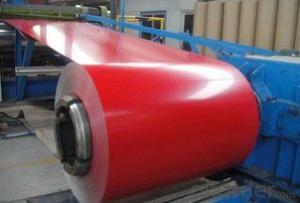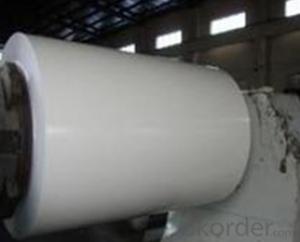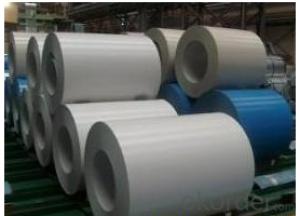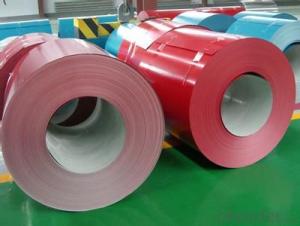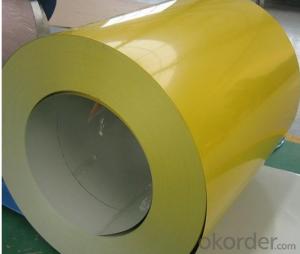Pre-Painted Galvanized Steel Coil High Quality White Color
- Loading Port:
- Shanghai
- Payment Terms:
- TT OR LC
- Min Order Qty:
- 100 m.t.
- Supply Capability:
- 20000 m.t./month
OKorder Service Pledge
OKorder Financial Service
You Might Also Like
1. Pre-Painted Galvanized/Aluzinc Steel Coil Description:
With GI as base material, after pretreatment (degrease and chemical treatment ) and liquid dope with several layers of color, then after firing and cooling, finally the plate steel is called pre-painted galvanized (aluzinc) steel. Pre-painted galvanized steel is good capable of decoration, molding, corrosion resistance. It generally displays superior workability, durability and weather resistance.
2.Main Features of the Pre-Painted Galvanized/Aluzinc Steel Coil:
• Excellent process capability
• Smooth and flat surface
• Workability, durability
• Excellent heat resistance performance
• High strength
• Good formability
• Good visual effect
3.Pre-Painted Galvanized/Aluzinc Steel Coil Images
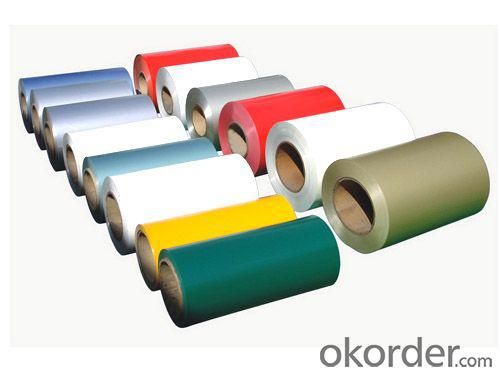
4.Pre-Painted Galvanized/Aluzinc Steel Coil Specification
Standard: AISI, ASTM, BS, DIN, GB, JIS
Grade: DX51D, DX52D
Thickness: 0.17-2.0mm
Brand Name: KMRLON
Model Number: coil
Type: Steel Coil
Technique: Cold Rolled
Surface Treatment: Coated
Application: Boiler Plate
Special Use: High-strength Steel Plate
Width: 20-1250mm
Length: customized
commoidty: pre-painted galvanized steel coil
Thickness: 0.13-4.0mm
width: 20-1250mm
zinc coating: 40-180g/m2
printing thickness: top side: 20+/-5 microns, back side: 5-7 microns
color: all RAL color
surface treatment: color coated
coil weight: 4-7 tons
coil ID: 508/610mm
packaging: standard seaworthy packing
5.FAQ of Pre-Painted Galvanized/Aluzinc Steel Coil
1. What’s the application of this product?
Roof, roof structure, surface sheet of balcony, frame of window, etc.
2. What’s the brand of the paint?
We use the best brand of all of the word—AKZO.
3. How to guarantee the quality of the products?
We have established the international advanced quality management system,every link from raw material to final product we have strict quality test;We resolutely put an end to unqualified products flowing into the market. At the same time, we will provide necessary follow-up service assurance.
4. How long can we receive the product after purchase?
Usually within thirty working days after receiving buyer’s advance payment or LC. We will arrange the factory manufacturing as soon as possible. The cargo readiness usually takes 15-25 days, but the shipment will depend on the vessel situation.
- Q: What is the average cost of shipping steel coils?
- The average cost of shipping steel coils can vary depending on various factors such as the distance, weight, dimensions, mode of transportation, and any additional services required. To provide an accurate average cost, it would be necessary to consider these specific details.
- Q: How many types of steel buildings are there?
- There are a number of designs which can be used to create different types of steel buildings as per the demands of the buyer or an investor. he various kinds of that can be constructed using steel are Homes, Hangars, Agriculture and Farm buildings for storage, Garages and Storage sheds, Open air sheds,, Barns, Arenas and stadiums, Automotive buildings with overhead doors and flexible framed openings, Religious buildings such as Churches and Temples, etc.
- Q: What kind of steel should be used for constructing a steel building?
- Please specify what kind of steel, is it structural steel (like wide flange, channel or Z-section) or reinforcing steel? For structural steel, all steel members that passed the requirement of ASTM-A360 are the best quality. While for reinforcing steel, it should passed the requirement of ASTM-D3963 for epoxy coated and ASTM-A615 (Grade 60) for deformed bars.
- Q: What are the common coil thicknesses available for steel coils?
- The common coil thicknesses available for steel coils can vary depending on the specific application and industry requirements. However, some of the most common coil thicknesses for steel coils range from 0.5mm to 3mm. These thicknesses are commonly used in various manufacturing processes, including automotive, construction, and appliance industries. For lightweight applications or where flexibility is required, thinner steel coils with thicknesses ranging from 0.5mm to 1.5mm are often used. These thinner coils are suitable for applications such as automotive body panels, roofing, and general sheet metal fabrication. On the other hand, for applications that require higher strength and durability, thicker steel coils with thicknesses ranging from 1.5mm to 3mm are commonly used. These thicker coils are often utilized in heavy-duty construction, structural components, and industrial equipment manufacturing. It is important to note that these are just general ranges, and specific coil thicknesses can vary depending on the specific requirements of a particular project or customer preference. Steel coil thicknesses can be customized to meet specific needs, allowing for greater flexibility in various industries.
- Q: How are steel coils used in the production of scaffolding?
- Steel coils are used in the production of scaffolding as they are typically cut and shaped into various components such as tubes, frames, and brackets. These coils provide the necessary strength and durability required for scaffolding structures, ensuring the safety and stability of workers who use them.
- Q: How do steel coils contribute to sustainability in construction?
- Steel coils contribute to sustainability in construction in several ways. Firstly, steel is a highly durable material that has a long lifespan. Steel coils are used in the construction of various structural components like beams, columns, and frames, ensuring the stability and strength of buildings. By using steel coils, the resulting structures require less maintenance and have a longer service life, reducing the need for frequent repairs or replacements. This durability enhances the sustainability of construction projects by reducing the overall environmental impact associated with material waste and energy consumption. Secondly, steel is a highly recyclable material. Steel coils can be easily recycled and reused in new construction projects. The recycling process of steel has a significantly lower environmental impact compared to the production of new steel. Recycling steel coils helps to conserve natural resources, reduce the extraction of raw materials, and minimize energy consumption in steel production. By incorporating recycled steel coils into construction projects, the demand for new steel production is reduced, resulting in lower greenhouse gas emissions and a smaller carbon footprint. Furthermore, steel is a material that can be prefabricated off-site. This means that steel coils can be manufactured in factories in a controlled environment, minimizing construction waste and improving construction efficiency. Prefabricating steel coils reduces the amount of material waste generated on-site and decreases the need for transportation of construction materials, thereby reducing air pollution and energy consumption during construction. Additionally, steel is known for its high strength-to-weight ratio, which allows for lighter and more efficient structures. By using steel coils, construction projects can optimize the use of materials, resulting in reduced material consumption and lessening the overall environmental impact. The lightweight nature of steel coils also facilitates easier transportation, reducing fuel consumption and associated emissions during delivery. In summary, steel coils contribute to sustainability in construction through their durability, recyclability, prefabrication capabilities, and high strength-to-weight ratio. By utilizing steel coils, construction projects can minimize waste, conserve resources, reduce energy consumption, and decrease the environmental impact, ultimately promoting a more sustainable built environment.
- Q: Can steel coils be cut to length?
- Yes, steel coils can be cut to length.
- Q: How are steel coils inspected for thickness using ultrasonic testing?
- Steel coils are inspected for thickness using ultrasonic testing by first preparing the surface of the coil and applying a couplant gel. Then, an ultrasonic transducer is placed on the surface and emits high-frequency sound waves into the coil. These sound waves travel through the material and are reflected back when encountering a change in thickness. The transducer receives these echoes and measures the time it takes for them to return. By analyzing the time delay, the thickness of the steel coil can be accurately determined.
- Q: How are steel coils protected from extreme weather conditions?
- Steel coils are typically protected from extreme weather conditions using various methods such as covering them with waterproof wraps, storing them in climate-controlled warehouses, or applying anti-corrosion coatings. These measures ensure that the coils are shielded from moisture, temperature fluctuations, and other environmental factors that could potentially damage or degrade the steel.
- Q: How do steel coils contribute to the agricultural industry?
- The agricultural industry relies heavily on steel coils as a crucial component for the production and maintenance of various agricultural machinery and equipment. These coils are primarily used to manufacture farm equipment like tractors, plows, harvesters, and irrigation systems. One of the key benefits of steel coils is their durability and strength, which makes them ideal for agricultural applications. These coils are processed and shaped into different sizes to create robust components that can withstand the demanding conditions and heavy workloads typically associated with farming operations. Steel coils are widely used in constructing tractor frames, ensuring the vehicles' structural integrity and stability. They are also utilized in manufacturing plow blades, providing the necessary strength to effectively cut through the soil and prepare the land for planting. Moreover, steel coils are crucial in creating harvester blades, which enable efficient harvesting and minimize crop damage. In addition to machinery, steel coils play a vital role in the production of irrigation systems, which are essential for agricultural practices. These systems require pipes and tubes that can endure high water pressures and resist corrosion caused by the elements. Steel coils are processed into these pipes and tubes, ensuring their durability and longevity, and thereby facilitating efficient water management and irrigation in fields. Furthermore, steel coils contribute to the agricultural industry by ensuring the secure storage and transportation of agricultural products. They are used in constructing storage silos and grain bins, which provide safe and weather-resistant spaces for storing crops. Steel coils are also utilized in fabricating transportation containers like trailers and trucks, ensuring the safe delivery of agricultural goods from farms to markets. In summary, steel coils have a significant impact on the agricultural industry. Their strength, durability, and versatility make them essential for manufacturing agricultural machinery, irrigation systems, storage facilities, and transportation containers. By providing reliable and efficient equipment, steel coils contribute to increased productivity, improved crop yields, and enhanced overall efficiency in the agricultural sector.
Send your message to us
Pre-Painted Galvanized Steel Coil High Quality White Color
- Loading Port:
- Shanghai
- Payment Terms:
- TT OR LC
- Min Order Qty:
- 100 m.t.
- Supply Capability:
- 20000 m.t./month
OKorder Service Pledge
OKorder Financial Service
Similar products
Hot products
Hot Searches
Related keywords
